#russia's borders do not end anywhere
Explore tagged Tumblr posts
Text

Who knew that it's totally anti-imperialist to want more Lebensraum….
24 notes
·
View notes
Photo
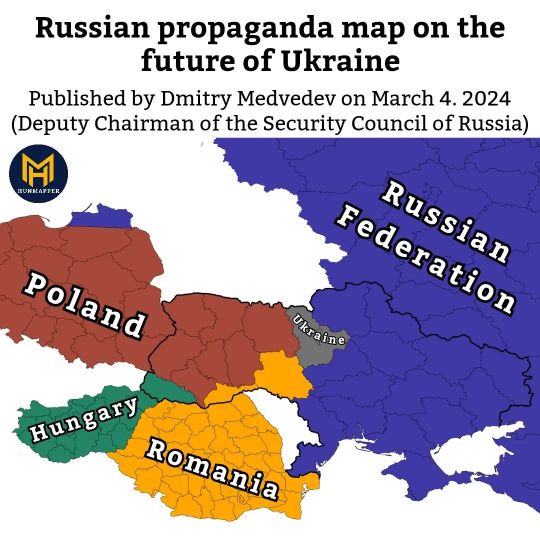
Russian propaganda map on the future of Ukraine
Published by Dmitry Medvedev (deputy Chairman of the Security Council of Russia) on March 4, 2024.
by hunmapper
Medvedev defined all territories on the left bank of the Dnipro River, and many on the right bank, as supposedly "integral" to Russia and within its "strategic historical borders." Russian forces currently occupy only a part of the eastern (left) bank of Ukraine but do not occupy any territory on the right bank of Ukraine. He presented his lecture against the backdrop of a self-created fantasy map of eastern Europe, depicting parts of western Ukraine under Hungarian, Polish, and Romanian control. The map shows Ukraine existing as a rump state only within the borders of Kyiv Oblast and the rest of modern-day Ukraine as part of Russia — well beyond the areas that Russian forces currently occupy, encompassing Crimea and the four partially occupied oblasts Medvedev claimed that the influence of sovereign great powers, like Russia, extends beyond their geographic borders, reiterating an earlier statement by the Russian dictator Vladimir Putin that "Russia's borders do not end anywhere" Additionally, he alleged that a state's "strategic borders," distinct from its geographical borders, depend on “how strong and sovereign” the state and its authorities are. The more "powerful" a state is, the “further its strategic frontiers extend beyond its state borders” and the larger the state’s sphere of “economic, political, and socio-cultural influence”
161 notes
·
View notes
Text
Someone else said this, I believe, but now I can't stop noticing it: discourse around the war in Ukraine is heavily affected by who the discoursers identify as agents in the conflict. What "we" should do is highly dependent on who "we" are. Someone who identifies the Russian state as an agent will say "Russia should withdraw to the Feb. 2022 borders and end the war!" and then someone else, who doesn't identify the Russian state per se as an agent but perhaps identifies Putin as an agent will say "well Putin can't do that, because of [internal reasons]". And someone who identifies none of the above as an agent might say "the US has to promise to halt further NATO expansion, that will assuage Russian fears and bring about an end to the war", or whatever. The content of these positions isn't really important here; if I'm getting some party's argument wrong, apologies. What's important is that people will conceptualize some entities as agents, capable of choosing their actions essentially arbitrarily, and will conceptualize other entities as something akin to natural phenomena, acting in more-or-less automatic ways in response to stimuli. And what policy prescriptions you make depends a lot on which is which!
I've looked for a better word than "agent" to use in the above paragraph, but I haven't found one. I think a lot of people here will interpret "agent" first in the decision theory sense: a being with goals which acts in the world to achieve them. By this definition, all parties to the conflict are agents. What I mean by "agent" here is something different, something like a "free decision maker". An entity who we may imagine making any decision we'd like, as opposed strictly to those decisions derivable mechanically from some process of operation. I hope that clears up any ambiguity.
Anyway, all of the above is not just true about the Ukraine conflict, but true of all of politics and indeed all of ethics. What "should be done" depends on who we are imagining to be capable of doing it. In truth, I think that all of us are "natural phenomena" in the above sense. However, if there is any entity that it makes sense to imagine as an agent, I think in practice it can only ever be oneself. What should the Russian state do to end the war? That's the wrong question to ask, because you aren't the Russian state. What should Putin do to end the war? That's the wrong question to ask because you aren't Putin. What should Biden or Zelenskyy do? You aren't Biden or Zelenskyy. The right question to ask, if you care about a particular issue and want to advance a particular resolution, is only ever "what can I do?" Because, in actual fact, you only ever get to choose your own actions. You do not get to choose the actions of any other party, ever! You can often influence the actions of other parties, through what you say or what you do, but you are still only influencing these actions indirectly—by way of your own, comparatively direct, choices of behavior.
Now, I get that this might seem like a... somewhat nitpicky perspective shift, but I really do believe it clarifies thinking significantly. When talking practically about concretely advancing a goal, it makes plain what the actual options before the interlocutors are. It helps activists and others avoid the common pitfall whereby they find themselves merely roleplaying as entities more powerful than themselves, rather than discussing actual strategy.
Conversely, when speaking abstractly about justice, we may freely imagine ourselves as any entity we'd like, we may assign agentivity anywhere, and make claims like "the Russian state should do this" or "Biden should do that", with no concern for the fact that in truth we are neither Biden nor the Russian state. This is because ethics is concerned with prescription-making, and it is perfectly sensible (if often ineffectual) to make prescriptions for others besides yourself. Indeed this is an equivalent task to making prescriptions for yourself in a hypothetical scenario, another indispensable ethical procedure. And anyway, so long as when we exit these conversations about abstract justice and re-enter discussions about advancing concrete goals we recall that we are in fact only ourselves, and not any of the entities we were imagining ourselves to be, there is no problem.
I suppose that all is to say: it is good to keep straight what we are actually talking about, ethics in abstract or activism per se. If we are talking about ethics in abstract, we must be clear with ourselves (and with others, if possible) that we are on something of a flight of fancy, if perhaps one we expect to generate useful outcomes. And if we are discussing activism—that is, in the broadest sense, politics as performed by individuals outside the established structures of power—then we need to be similarly clear with ourselves about precisely who we are and what we can in fact do.
84 notes
·
View notes
Text
Quote of the Day
Russia’s borders do not end anywhere.
Vladimir Putin
14 notes
·
View notes
Text
When Kēvens shared stage with Jackson Five

Anyone who can perform on the same stage just after the Jackson Five, live before a televised audience of several million fans, in Russia and its territories; another 10,000 in a sold-out show can perform just about anywhere on this planet. When Kēvens shared his lens from that unforgettable show, I punched him with this question: "So, you could very well have performed with the Beatles, Elvis Presley, and Tom Jones?" Kēvens did not move a muscle but left me blank with silence for a moment. Then, he broke the silence. "Well, I did receive a standing ovation." "Oh! really!" Kēvens is not the one to blow his own trumpet. In fact, I just remember, it was the trombone he had played in school. But, let's go back to the real deal, over 10 years ago when Kēvens got an invitatation which left him in wonderment. "This invitation would lead me to St. Petersburg in Russia and I was down to do three shows at the Ice Palace.""The news came from a booking agent who assured me the Russians would love me after my sizzling performance with Steven Tyler, the lead singer of Aerosmith, a rock and roll band based in Boston, US." "A lot of people were a bit concerned, based on the strained relationship between America, where I live, and Russia. I thought about it, and finally decided to go, for the good of my music career." "I travelled from Miami to Berlin and then to St. Petersburg. To get into Russia was really tight and this at times had my heart almost in my mouth." Kēvens had hardly settled at the five-star hotel before he began to explore the dynamic architecture which had his lend busy before rehearsals. "As I walked around, it was obvious I was a visitor, but my defined dreadlock hair had them believing I was from Jamaica." Taking nothing for granted, Kevens hired four members who play drums, bass, guitar, and keyboard to back him on stage. He had worked out his choreography for each of the two songs he would perform for the set. Of the three nights the most memorable was the one he shared stage with the Jacksons. "I was walking backstage, and saw who appeared to be the Jacksons, but that didn't seem real until I was told to prepare as I would be performing after the Jacksons. Then I actually bumped into Tito. 'Oh my gosh, you are Tito.' And, the rest of salutations came amid nervousness and fantasy." "I was dressed matrix style which includes a three-piece royal red robe which borders my black custom-built shoes. And, my natural well-groomed locks adding my 'ReggaeEDM', his musical style to my dynamics." The band struck like lightning with more than 10,000 volts of beats. The crowd roared as Kēvens took centre stage belting 'Don't Stand So Close To Me', a cover version released on his first album. "The entire theatre joined my mystic performance and I could see the Jamaican flag in the sold-out show." "I then went into the second song 'Please Don't Leave', adding more fire to the furnace of cheers, ending with a standing ovation". Kēvenswill be releasing his second album 'Call To Balance' with tracks such as 'This is Love', 'Little Boy Blue', 'Save Me', 'Battle for Peace', Sondores Legales', 'Burn Down The Throne', and 'Sweet Lady (Radio Mix). This album will be released about mid-October 2024. Read the full article
2 notes
·
View notes
Text
Why Is Canada’s Economy Falling Behind America’s? The Country Was Slightly Richer Than Montana In 2019. Now It Is Just Poorer Than Alabama
— September 30, 2024 | The Economist

Photograph: Associated Press (AP)
The economies of Canada and America are joined at the hip. Some $2bn of trade and 400,000 people cross their 9,000km of shared border every day. Canadians on the west coast do more day trips to nearby Seattle than to distant Toronto. No wonder the two economies have largely moved in lockstep in recent decades: between 2009 and 2019 America’s gdp grew by 27%; Canada’s expanded by 25%.
Yet since the pandemic North America’s two richest countries have diverged. By the end of 2024 America’s economy is expected to be 11% bigger than five years before; Canada’s will have grown by just 6%. The difference is starker once population growth is accounted for. The imf forecasts that Canada’s national income per head, equivalent to around 80% of America’s in the decade before the pandemic, will be just 70% of its neighbour’s in 2025, the lowest for decades. Were Canada’s ten provinces and three territories an American state, they would have gone from being slightly richer than Montana, America’s ninth-poorest state, to being a bit worse off than Alabama, the fourth-poorest.
The performance gap owes little to covid-19 itself. Canada did have a deeper recession than America after covid struck, partly because of stricter and longer lockdowns. Its gdp fell by 5% in 2020, compared with 2.2% in America. But Canada soon caught up. The country’s national income grew by 4% between 2019 and 2022, nearly on par with America’s, which expanded by 5% over the period.
The first of these is the services industry, which makes up about 70% of Canada’s gdp. In the aftermath of the pandemic Americans splurged on goods, which boosted manufacturers north of the border (American consumers gobble up around 40% of Canadian factories’ output). But they have since switched back to spending on domestic services. “The composition of American growth hasn’t been favourable to Canada,” says Nathan Janzen of Royal Bank of Canada (rbc), a bank. The job of powering Canada’s economy, therefore, falls even more to its own services sector, which relies on demand from Canadian households and the government.
Instead the divergence is more recent: since 2022 America’s economy has motored ahead, leaving Canada’s in the dust. The reason is not some bump on the road but what lies under the bonnet. Two drivers of Canadian growth have sputtered.
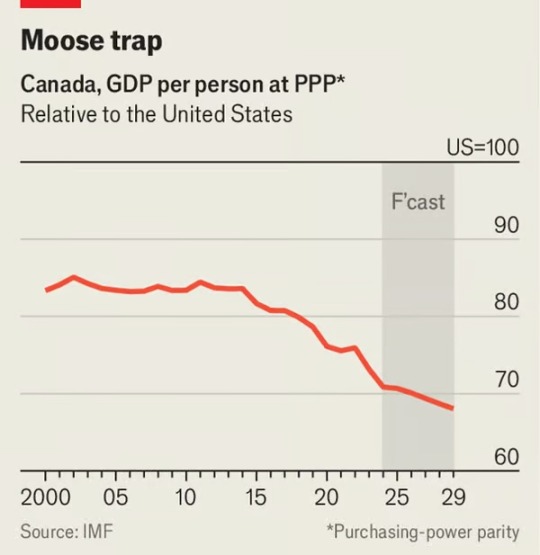
Chart: The Economist
Unfortunately, that demand has been throttled by higher interest rates. Monetary policy has had more “traction” in Canada than in America, says Tiff Macklem, the central-bank governor. In the latter, most mortgages are fixed for 30 years, whereas in Canada they are typically set for five. A greater share of Canadians than Americans have already seen their mortgage payments rise. This is all the more painful as Canadian households bear more debt, relative to income, than anywhere in the g7 club of large, rich countries. They now fork out an average 15% of their income to pay back debt, up one percentage point since 2019. And unlike Uncle Sam, Canada’s government has not tried to soften the blow by loosening the purse strings. It ran a deficit of just 1.1% of gdp in 2023, compared with 6.3% in America.
The second faltering growth driver is Canada’s petroleum industry, which accounts for 16% of exports. Canada underinvested in new production for years after 2014, when a collapse in oil prices hurt its fuel-dependent economy. In America, by contrast, oil-producing states suffered but consumers cheered. When prices spiked after Russia invaded Ukraine, investors did more to support American shalemen; the country’s crude output has rocketed. It was one-quarter higher in the first seven months of 2024 than it was during the same period six years ago. Canada’s has grown by only 11% over the same period.
Oil’s decline penalises Canada’s economy at large, because it is one of the country’s most productive sectors. That adds to a long-standing productivity problem. Growth in output per hour worked across Canada has been sluggish for two decades. It increasingly resembles Europe rather than America, which has benefited from a tech boom that has largely eluded Canada. Its gdp per capita since the pandemic has risen more slowly than that of every other g7 country bar Germany.
What Canada lacked in productivity it could long make up by having more workers, thanks to high immigration. Between 2014 and 2019 its population grew twice as fast as America’s. Canada has historically been good at integrating migrants into its economy, lifting its gdp and tax take. But integration takes time, especially when migrants come in record numbers. Recently immigration has sped up, and the newcomers seem less skilled than immigrants who came before. In 2024 Canada saw the strongest population growth since 1957. Many arrivals are classified as “temporary residents”, including low-skilled workers and students. They are more likely to be unemployed or in low-earning jobs, dampening growth in income per person. Canada’s unemployment rate rose to 6.6% in August, from 5.1% in April 2023.
Take all this together and it is clear that the seeds of the decoupling were sown much earlier than the pandemic, with sagging services the latest in a series of ailments. There are no quick fixes. Canada’s central bank has cut interest rates three times so far this year, from 5% in May to 4.25% today. But many borrowers will still feel worse off because they have yet to renew their mortgages. Immigration restrictions have been introduced, including a cap on international students, but that won’t solve Canada’s chronic productivity problem. Catching up to Alabama may soon seem like a distant dream. ■
#Finance & Economics#Economic Decoupling#Canada 🇨🇦 🍁#United States 🇺🇸#Canadian Economy#Montana#Alabama
1 note
·
View note
Text
And American college students wept, for there were no more causes for protest - LGBT rights were guaranteed forever, racial bias finally put to rest for good and with reparations. Reproductive rights received ironclad legislation, and native rights were finally achieved with a good mutual consensus. Global warming went the same way as the hole in the ozone - the US lead a striking, globally coordinated effort to finally mitigate and undo the damage - and all finally breathed fresh, clean air. The refugee crisis at the border was of course a thing of the past - either well integrated into society or sent back to homes finally made safe. Police violence and racial profiling, of course, were non-issues now - especially with inclusive, community-based and social policing replacing the heavy handed protection-and-serving-of-the-few of the past. Their own higher education was of course now fully funded by the state, and the concept of predatory 'student loans' seemed laughable. Medical care, transportation, shelter, nutrition - all became enshrined in law as human rights. Preventable deaths from hunger, from exposure, from mental illness - all went down into insignificance.
And so finally they looked out to the world for injustices to correct, but they were hard pressed to find them - Ukraine and Russia were at peace, finally, and reparations and assistance to rebuild in Ukraine were ongoing. Russia was, of course, free from tyranny, and undoing decades of stagnation, nepotism, internal racism, LGBTphobia -no, they had to look elsewhere. China, of course, had long freed the Uyghurs to live their lives with dignity, afforded numerous new freedoms to its citizens, and made a brave series of agreements with Taiwan and the US and Japan to end decades of suspicion and mutual jabs.
Romani anywhere in the EU were finally properly guaranteed their safety, alongside Irish Travelers, Canadian First Nations, Assyrians, the Bashkir (well, we already said Russia was doing better now!) -
And Sudan - well, the process of peace and reconciliation was tough, but inspirational. The hundreds of thousands dead, displaced - all wrongs were finally acknowledged and put to rights. Haiti is finally recovering from its own upheavals, Boko Haram, ISIS, the Taliban all agreed to disarm, vowed to compensate all they have wronged, to rebuild from the damage. Syria and Lebanon were no longer tormented by despots, and Iran with them - finally, again, the pride of Persian heritage, a place of dignity and comfort for all its people.
On and on the American college students looked for causes - some even went so far as to reignite pineapple on pizza, but society has of course moved on from such divides - so naturally, there could only be one remaining issue at hand. Clocking in at roughly 10 thousand kilometers away as the crow flies, depending on where you take off and land exactly, in an objectively tiny strip of land, there was one war they had to weigh in on. All other issues, near and far, greater in every possible metric, were finally fine - it was time to tell one country it shouldn't exist in favour of another, to harass people of that country - or even those basically unrelated to it, who were still somehow unclean for not working to dismantle that country. The American college students wept tears of joy, now, for the last and most important cause was at hand.
#I don't understand I really don't#Palestinians? Of course#Jews? Of course#People who have fucking skin in the game#Why is it that EVERYBODY ELSE decided they *must* have an opinion about this thing AND that it trumps all other struggles#have they lost their mind?#what the fuck is this?#“globalize the intifada” yes I'm sure you'll be righteous and glad when your grandpa sits on a bus that blows up#give me a fucking break#i/p
5 notes
·
View notes
Text
Just a warning now, something I've seen coming for a while now, don't be surprised if some time this winter or spring we see a complete collapse, Afghanistan style, of the Ukrainian Armed Forces.
The writing has been on the wall for a while now, pretty much ever since the UAF didn't make a major puncture, or any puncture for that matter, through any of the main Russian lines of defense in the first few days of the Offensive anywhere on the frontlines where they attacked.
It doesn't matter that they seem poised to secure with infantry a small section of trenches Northwest of Verbove, East of Robotyne that does in fact bypass the first line of defense because Ukraine no longer has the offensive potential to exploit it.
And now with Poland ending weapons shipments to Ukraine, the US clearly looking for a way out, and Russian Forces looking poised to launch a missile offensive, pretty much ending any ideas Zelensky may have had at compensating for the loss of Polish supplies with domestic production.
What domestic production? The Russians have grinded out of existence Ukraine's domestic productive capacity.
Long story short, they don't have the productive capacity, the manpower, the munitions, the ammunition, or the logistics to continue this fight alone.
Yet, the Ukrainian leadership went so far as having a law passed that preemptively prevents Zelensky from negotiating with the Russians as long as Putin is the President and as long as they have their Forces occupying any Ukrainian territory based on their 1991 borders.
So you have a regime that cannot continue the fight alone, cannot negotiate, and has now lost over 300'000 men, with many times more severely wounded, millions of refugees have fled the country, their infrastructure and production is decimated, and its allies are backing out.
So again, I'm going to say it now.
Don't be surprised if we see a complete, Afghanistan-style collapse of the Ukrainian Armed Forces sometime this winter or spring or whenever.
I'm not trying to say I know exactly what's going to happen, no one does and anyone who says they do about any war, is thoroughly full of shit.
What I am saying, is don't be surprised if it happens.
All the conditions are there. For some, though not all, of the same reasons.
There are some differences, Ukraine had a much stronger military it started this war with, but the inevitable crush of Russian Forces grinding forward, learning from their mistakes, honing their skills, all the while Ukraine was spending its best forces on losing battles.
The saying, "pick your battles" doesn't exist for no reason.
Ukraine chose poorly, by defending every inch of land, spending endless lives, weapons systems, and ammunition on battles they knew they couldn't win, like Bakhmut, and the Kharkiv and Kherson Offensives. Both of which were a pointless waste of lives spent on taking tiny farm villages instead of building the kind of Defenses the Russians did in Zaporizhzhia and Donetsk.
Had Ukraine's leadership chosen to defend land they knew they could, instead wasting Military capabilities and lives on a pointless and exceedingly costly offensive, they wouldn't be in this position today.
And then they did it again! And this time never even broke through a single main line of defense in nearly 4 months, at the cost of more than 70'000 Ukrainian lives.
The insanity of these policies speak for themselves. They don't even make any sense from a strategic, or even tactical point of view. It's just plain stupidity. Any idiot can make these observations.
I haven't even mentioned the simple fact that Russia is, and always was going to be a MUCH MUCH bigger country, with a much much greater productive capacity, and a population pool many many times greater to draw its conscripts from.
And now the Ukrainians are likely going to face collapse. All because they chose to listen to whispers of those who would make them heroes in the eyes of the Western media, at the cost of the country they claim to represent and love.
Love, even as they run 24/7 war propaganda on tv with no other stations allowed, they refuse to hold elections next year, and are in fact extorting the US for billions more dollars before Zelensky will hold any kind of elections, they raid churches, arrest priests, journalists and political dissenters, the ones they don't assassinate and then brag about.
And to add to all this, Zelensky will never ever ever ever again get the kind of weapons or men to launch an offensive of the kind he just fought.
The Ukrainian Armed Forces Offensive capabilities are essentially no more. Gone. Completely and utterly decimated. Tens of thousands of men, gone. All for roughly about 8-12km of gains, depending on where you're measuring.
They've also lost about an equal amount of territory in the Kupiansk direction, so there REALLY was no point in these 70'000 deaths.
Think about that.
This has to stop, but I'm afraid it may be way too late for Ukraine to come to its senses in time. And I don't think the Russians feel like talking anymore.
That's why I expect a collapse.
#ukraine proxy war#russo ukrainian war#russian smo#russia smo#special military operation#ukraine collapse#ukraine conflict#geopolitics#socialism#communism#marxism leninism#socialist politics#socialist news#socialist worker#socialist revolution
4 notes
·
View notes
Text
Historical Events and Questions
//Greeting everyone, Mod Sam here. Today, I'm doing something different compared to my other methods. As you know, one of the main themes of this story blog is history and how it can significantly alter our modern world as we know it. Unfortunately, given the key factor that the majority of my audience doesn't know what history even is, I took it upon myself to fix that with some... unique solutions.
//First, I tried to make two Google Docs explaining the main topics about the Stasi and the Soviet Union, but since they did rather... poorly, I've felt as if I needed to stop focusing on the worldbuilding for now and channel the rest of the writing into the characterization and dialogue in order to improve the story, which is still my main objective. However, I wasn't just going to let the historical aspect disappear into irrelevancy, though it would be less focused on untill we get deep into the story.
//Then, one of the anons came to me and suggested that I do a similar strategy for worldbuilding by organizing it into a separate tab for each key piece of worldbuilding, which is ironically enough what I originally planned to do when I had time, but I didn't because since Nagito appeared, I got flooded with asks related to him, so I didn't have time to make it.
//But now, I'm ready to answer these important, vital questions that you all have honestly been waiting for since we started this story, so I'll be going into this in question format, answering the questions that are massively relevant to this blog and the plot as a whole. So, without further ado, let's begin.
'What is the Cold War? And how does it affect the story?'
//The Cold War was essentially a worldwide conflict fought between two superpowers. On one side, you had the United States of America, coming off of their absolute victory against Nazi Germany and Imperial Japan after the Second World War, with them being the only nation that had their homeland basically unscathed or damaged during the conflict (Unless you count Pearl Harbor) and being the champions of democracy, and the other major superpower in this world was the Soviet Union, aka Russia, who pretty much suffered the absolute worst amount of damage and casualties of all countries that were involved in WW2, but had rapidly rebuild themselves to become on par with the US, in terms of military power and influence.
//The thing that made the Cold War unique was that both America and Soviet Russia never fought one another, instead deciding to channel their international, ideological influence through wars in Africa, Asia, and Latin America, supporting the participants on opposing sides, as well as a massive nuclear arms race, and what most people remember the most when it comes to the Cold War, espionage. If you have ever seen a James Bond film, you know what I'm talking about, except it was far more difficult and complex than Bond.
//The Cold War began shortly after the end of WW2 and lasted untill 1991, when the Soviet Union and Eastern Bloc collapsed and formed the modern Russia we all know and love today, leaving the US and NATO as the sole victors of the conflict. Notable conflicts and events of the Cold War era include Korea, Vietnam, the Cuban Missile Crisis, Angola, the Arab-Israeli Wars, the Iran-Iraq War, and numerous more conflicts I can't even mention here. So in short, this conflict is a major part of the story and plot.
'What is the Soviet Union? And why do they matter?'
//The Soviet Union is a complicated topic to get in itself, as I did a whole Google Doc explaining why, but if you want a simplified short version of it, they were essentially a political entity formed out of what remained of the former Russian Empire (Yes, Russia was an empire back then.). But it wasn't just Russia, it was anywhere the Russian state shared a border with, with a few exceptions. Countries that joined the Soviet Union besides the Russians were Ukraine, Belarus, Kazakhstan, the Baltic States, and several others.

//By 1917, Russia was on the immediate verge of collapse, as constant losses to the Germans, abysmal tactical command, and incredibly poor supply issues both at the front and at home caused an immediate collapse of the country. Riots broke out over food shortages, police clashed with protesters, and even with military soldiers who had mutined and had now come to join their fellow civilians in the streets. Eventually, Nicholas II resigned as tsar (Or the king) of Russia, a temporary government made up of several Russian politicians, who came together to stabilize the situation and try to control the rampant amount of anarchy and chaos in the city.
//However, they weren't able to hold onto power for long. A Russian political communist by the name of Vladimir Lenin, a hardline Marxist, who also rocked the mother of all goatees, eventually led a revolution against the government, overthrowing them with relative ease and installing himself along with his political faction, the Bolsheviks, essentially a group of radicals that were tremendously just as bad, if not worse than Lenin.
//After a brief and particularly bloody civil war, and a period of state violence known as the Red Terror, Lenin passed away in 1924, giving the reigns of power to Joseph Stalin, who is basically history's version of Maverick Storm and Junko Enoshima combined, and would become one of the most tyrannical and monstrous dictators and men that ever lived. Stalin essentially transformed the Soviet Union down a different path, at the cost of millions of deaths in the span of decades, but that's a really lengthy story for another time.
'Explain the racist system of Apartheid. How does it affect the society of South Japan?'
//Apartheid South Africa is certainly a very interesting topic in history, as it is the absolute dark reality the American state could've been if just a few awful decisions had been taken. Considering that Apartheid is a really underrated villainous part of history that doesn't even get mentioned as much as other parts of racism and bigotry, I decided to use that as the basis of South Japan.
//Apartheid was an institutionalized version of racial segregation across South Africa when the minority white population enslaved the majority black, African population and segregated them in basically every part of society imaginable, as well as dominated the culture, society, and politics of South Africa from 1948 to the early 90s. For example, there was a law that forced black Africans to be removed from their homes and forced into segregated neighborhoods, and laws made it illegal for South Africans to pursue sexual relationships across racial lines.
//Imagine if Hitoshi and Kaori never married due to the existing legislation law banning relationships between racial boundaries or if the Owaris were evicted from their household due to being African-Japanese, so that's one of the numerous examples of Apartheid. Think of the American South in the 1960s with segregation, except abysmally worse. In fact, most of South Japan's policies when it comes to racism and sexism are based off of South Africa's. Apartheid officially ended in 1991, when the legislation was repealed and elections were held in 1994 that elected Nelson Mandela, a prominent opponent of apartheid, as the first black African president of South Africa.
//In short, Apartheid lives on throughout this alternate version of Japan, as you have all been shown with Hope's Peak.
'How is Japan divided in this AU? Explain.'
//Well, the division of Japan happened due to Operation Downfall, the planned, amphibious invasion of Japan during WW2. While in our timeline, the nuclear bombs prevented any such invasion from happening due to the American government not wanting to waste more lives to take the islands, in this AU, the invasion goes underway resulting in almost the entire Western and Southern portion of the nation taken by the Americans and British, and the Russians take the Northern side of it, and the island of Hokkaido as well. Naturally, it was divided along the same lines as Germany was, with Britain and the US getting the Southern portion, while the Russians gained the rest of the North to themselves.

//Naturally, to the Japanese public, this didn't particularly sit well, as they feared being occupied and seeing almost half their culture and national identity being stripped away by foreign powers, especially Russia. But in the end, the partition was signed and Japan was officially divided amongst the three powers.
//Fun fact, China was originally supposed to get a portion of the nation in the middle of the country, but due to the Chinese Civil War and China falling to communism in 1949, they were denied that position.
'What is the Stasi? How do they matter?'
//The Stasi are essentially the foreign and domestic intelligence network of East Germany, similar to the Kgb. Formed during the 1950s, and located in East Berlin, they served as one of the most effective spy agencies of the Cold War, and the most feared.
//If you were caught by the Stasi, you are significantly screwed, as they would psychologically manipulate their victims and literally make them go insane, all the while disguising their involvement in the manipulation themselves. Think of abuse stories, and child abuse, incredibly toxic relationships, and the Stasi would certainly use such tactics to their advantage. It is disgusting yet effective to them at the same time.
//They maintain their information through an extensive network of civilian informants, only extending their reach to unprecedented levels. About 1 of every 63 East Germans was a Stasi informant, and they possibly have agents in the millions in the state, and abroad. They also financed several Neo-Nazi groups to discredit the West and spread disinformation about HIV and AIDs that the US created the diseases, and even tried to assassinate the pope. In short, they are probably the most degenerate group of individuals that we have on this blog so far, and it's saying something when we have people like Junko Enoshima and Junya Utsugi, who are scumbags on their own.
//So, I'm going to stop here for now. I'll be sure to update it when I can since this post is taking an incredible amount of time to create and post, as well as the fact that I don't want to bore you all with this, as I just felt like these were the most important topics to address so far. Obviously, this is not the end of the lore tunnel, as I'm making sure to update the lore constantly whenever I'm not occupied with the story or as the plot and the story goes on, and I do intend to explain more, just in different areas that simple posts like these cannot explain.
//I seriously hope you enjoyed this lore post, and I will post a link to it in the tab, in the Lore/Worldbuilding section. Otherwise, I hope you all have a great day, and I'll see you shortly!^^.
3 notes
·
View notes
Text
'Cillian Murphy has revealed how the cast of Oppenheimer were impacted by Russia’s invasion of Ukraine.
The actor stars in Christopher Nolan‘s critically acclaimed film as Robert J. Oppenheimer, the real-life American physicist who played a pivotal role in the creation of the atomic bomb.
Speaking exclusively to NME, Murphy explained how the cast were hyper aware of the events in Ukraine, especially after it emerged that Russian president Vladimir Putin had responded to international sanctions by lining his borders with tactical nuclear missiles.
“It was everywhere, and we were fully aware of that,” Murphy said of the invasion. “The threat [of nuclear war] has escalated and receded over the years since 1945… and now it’s back. It’s always there, this Sword Of Damocles that is hanging over us.”
Elsewhere in the interview, Murphy admitted that he didn’t socialise much while filming Oppenheimer, due to the intense demands of his role.
“I didn’t go out much. I didn’t socialise much, mainly because of the amount of work I had to do… I became so immersed in the role.”
The actor also explained how Nolan helped him to “unlock” the character with an “amazing phrase”.
“Chris used this amazing phrase. We were talking about Oppenheimer’s arc and he said, ‘You know, he’s dancing between the raindrops morally.’ That unlocked something in my mind when I was preparing,” he recalled.
Murphy further explained of Oppenheimer: “I do think that he believed it would be the weapon to end all wars. He thought that [having the bomb] would motivate countries to form a sort of nuclear world governance. He was naive.”
In a five-star review of the film, NME said: “Not just the definitive account of the man behind the atom bomb, Oppenheimer is a monumental achievement in grown-up filmmaking.
“For years, Nolan has been perfecting the art of the serious blockbuster – crafting smart, finely-tuned multiplex epics that demand attention; that can’t be watched anywhere other than in a cinema, uninterrupted, without distractions. But this, somehow, feels bigger.”'
3 notes
·
View notes
Text
Is it true that indigenous north american societies had generally better agricultural practices that produced more outputs than contemporary european ones with less environmental destruction?
...well no, for a variety of reasons, though the statement does have a little truth in it. They had (and some who still farm likely still have) better knowledge of the local conditions. This is true in the general case of pretty much every agrarian society, wherever you look. An individual farmer with experience in a region will tend to slightly outperform farming based purely on scientific modelling. This is because scientific models built up over a few weeks or months currently have to be simplified substantially relative to human models built up over years or decades, and thus will necessarily be a conservative estimate of what can be produced from given land.
We also know that while their outputs may have been better than contemporary european agriculture in that particular region (which is what we'd expect, the europeans had generally entered a new climate zone without crops bred to handle that, whereas maize was bred to handle most of the areas it was originally grown in) the outputs also didn't come anywhere close to modern agricultural outputs. There's actually a really easy way to tell this, and that's that the population of the region that would become the United States was substantially lower even at its peak pre-colonization (before the plagues) than it is today, but most calories in the Modern United States are produced domestically. A region over time will tend to approach its equilibrium, and we don't see the high-equilibrium population of today in the archeological record. In fact, we actually see a far lower population essentially across the board. For instance, the entirety of the great plains throughout both the US and Canada had a population likely under 100,000 at its peak pre-colonization, and this vastly expanded with modern intensive agriculture. This did lead to a few problems (the dust bowl for one, it turns out it's surprisingly easy to lose your topsoil once you go at it with a disc plow, so there's a lot you need to do to prevent that happening) but these problems are actually almost entirely solvable with crop rotation (something independently invented by essentially every agricultural society at some point. In North America there was a three crop cycle, the famous three sisters, squash, maize, and beans. Much of Europe had a similar cycle, and indeed, much of the East Coast European Farmers, at least initially, had a similar cycle!) So the question is, what happened to change this? Well.
The crop rotation issue though is almost entirely a policy problem that goes back centuries and has complex causes. Many farmers would love to rotate crops or let fields go fallow for a time today. This was, in fact, what subsistence farmers tended to do historically. The problem was, in the rush by the United States in particular (other countries did this also but to a lesser extent, the US was very successful and interested in attracting immigrants in a way pretty much only Brazil really competed with, but we're not talking about Brazil today) to expand into the great plains (killing any natives who didn't like that, of course. This tended to be what happened the moment someone got railroads and bordered an arid region and suddenly could move an army there. Russia did this across most of Northern Asia, China did it into some parts of Greater Mongolia and the Western Deserts, Argentina did it into Patagonia and France did it into the Sahara). Anyway, here's what happened there.
You see, the US, by making it so easy for nearly anyone to claim land that they were busily killing their way across, created a whole demographic of subsistence farmers with very little training in agriculture, who ended up having to relearn farming essentially from first principles in a new and hostile environment. As they were not farmers, (and indeed nor were the indigenous people in the area, they were subsistence hunters who'd recently begun to ecologically collapse the bison herds after getting ahold of horses, and would have probably succeeded at causing a famine over the next century had the US government not decided to ecologically collapse the bison herds first for genocidal conquest reasons) they had no knowledge of crop rotation or letting fields go fallow, and no one to observe doing this. As a result, they screwed up immediately, the consequences emerged over the next few decades, and the dust bowl happened, which meant a lot of farms ended up getting foreclosed on because of how subsistence farmers interacted with the economy at the time. Notably, a lot of the people who stayed actually did end up subsidized by the federal government to let fields go fallow, and government people would come by to explain how to do this! The government had found out the problem, and this actually was really good at abating it, and often this allowed yields to be maintained at close to their original levels! The problem was, you suddenly had all these banks owning a great deal of land, and banks aren't farms, so what would happen is the banks would sell these huge plots of land to larger companies (made up of people who didn't farm and didn't know how to tell who knew how to farm to staff their new land) because it was cheaper to sell in bulk than individually.
Meanwhile, at the same time, grain subsidies emerged as a way to try to inject money into the disintegrating economy of the great plains. This combined with the in-theory-smart-but-in-practice-perverse-incentive-creating way water quotas were and still often are allocated (use-it-or-lose-it, as opposed to form of cap-and-trade for water usage) meant that there were suddenly huge financial incentives to grow thirsty and extremely intensive crops all year around. Grain is intensive, and because of the weird kind-of-illegal-but-also-not-easily-enforceable-by-the-woefully-underfunded-state-governments way that one farming company can dip into the subsidies multiple times, it's always profitable, and thirsty crops are desirable because if you don't use your water up to your cap you're getting less next year. This meant that crop rotation, better suited crops, and fallow fields could actually destroy a farm financially over time. The obvious solution is to cut subsidies or figure out how to enforce against double-dipping better and to change water allocation procedures, but cutting subsidies is unpopular and changing water allocation procedures is not something people think about unless they're actively buying large quantities of water, and enforcement is expensive and requires qualified inspectors, which would require taxes, which are unpopular. These however are all policy problems combining to create an incentive structure which actively punishes good agricultural practices. (They're also at least partially Reagan's fault because of that particular administration's belief that "paying farmers not to farm" (letting fields have a fallow phase) was stupid, which led to those subsidies being cut and intensifying existing problems.)
So the statement of "native people of the americas were better at farming than europeans in the region and did less environmental damage for similar yields" is only kind of true. The first part was only really true for a short while on the (some of the) east and (most of the) west coasts and some parts of the midwest and south, the Great Plains were almost entirely unfarmed until the 1800s and were initially farmed by people who didn't know how farming worked. Arguably if they'd been farmed by actual farmers instead of terminally optimistic non-farmers, the Dust Bowl wouldn't have happened in the first place. Later, modern, more intensive agriculture was invented, which does produce far higher yields than any historic agriculture does, whether the people know the land or not. If this was not true, the world population would have stayed stuck around a couple billion. This can be environmentally damaging (nitrate contamination is a real problem that should probably get figured out sooner rather than later) but the question is one of mitigating the damage more than stopping modern agriculture, because stopping it would almost certainly kill billions.
You should support some level of reparations to the native peoples because the various genocides has led to impacts well into today, and more generally, doing massacres as a matter of state policy is a thing that should be apologized for. It's unclear what form those reparations should take, I favor something like cash to be paid in, say, monthly installments over a few decades, because this would have the added benefit of setting up UBI infrastructure for future use while also giving survivors of genocide and their descendants the chance to be the first test case in the US for UBI and getting to experience the benefits thereof first, though other forms of reparations could be considered. Maybe this could also include granting full and proper citizenship to the native peoples rather than the weird bantustan-esque system we've got going on now that continues to make it a huge pain to get government services for many native people and native-majority communities in the US.
You should not, however, base your support of the native peoples on something they supposedly did better, because I can essentially guarantee you that "they did this better" statement comes with dozens of caveats. Large-scale environmental destruction over time was not invented in Europe three hundred years ago, and in fact has been a standard practice of life for nearly two and a half billion years, and no species, much less small group of one species, is immune to doing it or indeed particularly good at not doing it. Consider instead basing your support on "doing multiple genocides and then variously disenfranchising and granting a weird kind-of-a-citizen-but-not-fully-able-to-use-many-government-services-status to people is a bad thing to do and that should definitely be fixed and probably apologized for in some concrete way."
0 notes
Text
So I haven't really (or at all) commented on the US bombings in the middle east. These bombings aren't helping anyone.
"The US conducted major airstrikes on 85 targets across seven locations in Iraq and Syria on Friday, the start of what will likely be a series of larger-scale US strikes on Iranian-backed militias who have carried out attacks on US troops in the Middle East."
85 targets?
And.. the US supposedly hit all of them?
But out of all of those attacks... no one? No one died? Were the targets empty? Was everyone told ahead of time to leave, and hitting these bases was nothing more than political posturing? These places were intelligence centers (supposedly) but had no staff inside? Either people did die, and the US is trying to claim a moral high ground, or no one died, just like they're reporting, which would just mean that the US is bombing places for the sake of bombing them.
Which, they likely are, right? Drop a bomb anywhere around the country 85 times, and you're more likely to hit and kill someone. But the US can't just let three deaths go unanswered, apparently.
https://www.wsj.com/world/middle-east/iran-backed-groups-continue-to-target-american-bases-as-u-s-plans-further-strikes-08917af0
"Iran-aligned militias in Iraq and Syria have carried out more than 165 attacks on American bases with rockets, missiles, drones or mortars in recent months, according to the U.S., seeking to put pressure on Washington over its support for Israel and trying to force the American military to leave."
So 165 attacks... only 3 died.... and 85 targeted attacks... no one died.
It seems to me that no one actually wants Americans, Iranians, or Iraqi's dead.
Just that Israel wants to exterminate Palestine, and the world is trying to react how they think they SHOULD react. Not to actually stop any slaughter in Gaza.
Where are we not seeing the US do this? Ukraine, or Russia. Where targeted strikes, with or without casualties, would be taken as an act of broader war. We're seeing the US moved its bombers around, and apparently have a wholly death-free bombing spree.
We've seen NATO undertake a massive exercise near Russia, but will they withdraw when it's done? 90,000 men. We've seen Estonia begin building 600 bunkers along its 294 kilometer border. That's a bunker every 0.49 kilometers. Or every 0.3 miles. That's a ton of bunkers, practically one on top of each other. We've seen Poland buy a LOT of war equipment from the US. China's economy isn't doing well, and apparently 315,000 Russian troops have died or been injured in Ukraine.
https://www.reuters.com/world/us-intelligence-assesses-ukraine-war-has-cost-russia-315000-casualties-source-2023-12-12/
All I see now is a lot of posturing. Russia and China don't look ready for a war, and no one's actually trying to stop Israel. Iran is making a fuss, sure, but sending in an army? It's supporting Hamas, that isn't a secret. But it isn't sending a fully fledged army and doing everything it can to help Palestine. Much like the international court isn't doing much of anything.
Now, I believe in the end of days, see the blog title. But this isn't the big invasion, it's Israel trying to take all of Palestine for itself. The US, the UK, unless they actually step up? Are just acting like they're doing something; escorting ships in the Red Sea that are getting attacked regardless hardly counts as doing something.
So I haven't said much on the topic because there isn't much to say. And I don't take delight in people suffering, or dying. These are living, breathing people. The Palestinians are alive as much as the Israeli's. And while there are bombings going on, there's allegedly, supposedly, been little loss of life on the Iran/US side of things.
Please consider donating to someone in need, even if it's not someone in the middle east. We could all use a little compassion.
0 notes
Text
I see people asking this question seriously and I want to address it.
Why won't Ukraine just give russia some land?
Well, when you hear "land" what are you picturing? Acres of untamed wilderness? Fields of wildflowers stretching into the horizon? Picturesque unsettled mountain cliffs? Miles of empty desert along a highway? Please. If Ukraine had those laid out neatly on the border and russia wanted them, our government would have long sold them for discounts on natural gas. We've had pro-russian governments before. We've had stupid fail governments before. We've had the "sure you can park your military fleet in our port city in exchange for a discount on natural gas' government before.
The Ukrainian flag is a stripe of blue above a stripe of yellow. This symbolizes (low-res depicts, really) sky above a field of wheat. Because that's what most of the territory of Ukraine is. Cultivated land. Developed land. Settled land. Land where people live.
The russian advance is measured in villages, towns, and in individual fields, hills, and field-sized forest patches between them. Because that's what's there. Settlements. People's houses and sources of food.
Three things happen to people whose houses those are:
They die. Their houses, roads, fields, schools, shops, workplaces get bombed while they're there and they don't make it to the ambulance (or, no ambulance comes because no ambulance can come because Russian fire does not respect green corridors, first responders or whatever else). You'd think that ends the story, but those people tend to have neighbours, children, spouses, parents, friends, siblings, coworkers, casual facebook acquaintances. The story very much does not end here.
They evacuate. They abandon their homes, their gardens, their fields, their machinery, their livestock, depending on available transportation often their pets, depending on people's individual stubbornness often their elderly relatives who refuse to go anywhere (and their young children win in the horrifying calculus of who to prioritize). Some of them join the army to go and try to get their homes and their neighbours' homes and their families' homes and their casual acquaintances' homes back. Some of them try to settle into new lives on new land, starting from zero plus their new neighbours' generosity (modified by how much their new neighbours actually have to spare). Some of them flee abroad, where they don't know the language and don't know how to use the kitchen appliances. Some of them have cushy savings and distant relatives happy to welcome them. A vanishing percent of them doesn't want to go back and isn't angry they had to leave. The rest want their homes back, if only so they can sell them to buy a washing machine that actually works for their new ones. All of them look back and hope everyone they knew survives. (This won't happen, just due to the law of large numbers. Too many will die and have died). These stories aren't over either
They stay. The tanks roll through their roads without stopping, and when they go to the local military point to sign up with the Ukrainian army they get a grimace and an awkward explanation that they can't do this from here anymore, and also don't talk so loud because the two eighteen year olds in russian fatigues with scared eyes over there on the corner have assault rifles and were told we're all fascists here. I won't detail what happens to them; the world knows.
These people are what's behind the vague word "land". They constitute the territory of Ukraine. The trampled and blown up and mined fields of wheat do not belong to the people in Kyiv sitting in pretty buildings and having skype calls with world leaders. Those hectares and square meters and miraculously still standing houses belong to them.
This is why "Ukraine" (read: Zelensky and his slo-mo trainwreck of a government) can't just "give" (read: reward the invasion, incentivizing repeats in the future) russia some "land" (read: settlements full of people that the current russian government wants to ethnically cleanse).
And why any given individual Ukrainian you meet might just get incoherent with rage at the suggestion.
We elected those people so they'd protect us, not sell us.
“why can’t ukraine just give some land to russia?” 20 days in mariupol is on youtube! hope this helps. 😊
#reblog#Ukraine#if you (generic) fancy yourself a serious war analyst but think land is just dirt and no big deal: get FUCKED
586 notes
·
View notes
Text

Born in the late 1800′s in Blagoveshchenk, Russia
Mother was a minor noble with a small title
Father came from a mining family, no title but wealth
Father bought land that yielded the Nezhdaninka mine
Twin brother, Mikhail
Began to develop power to take illness away & heal people after adolescence
Brother and Mikkah were captured (potentially sold) to the precursor of Hydra in the early 1900′s
Spent almost 40 years in captivity; brainwashed and tortured into obedience; programs similar to the Winter Soldier & Red Room experiments; experimented on to see full abilities & powers used to take life and give life / extend life of officers or regimes etc.
Of note:6 years into captivity was told that her brother had died; was not kept in the same place or sent on missions in the same vicinity as her brother during the remainder of her time in captivity to keep the truth a secret from her
Managed to escape in the mid 40′s as ww2 came to an end and hydra forces were broken and hydra structure was falling apart
Has led a few semi normal human lives since then
In general spends a lot of time in the wilds or in countries with less advanced tech and less capabilities of tracking people - also countries where she can do the most good and travel from place to place without rousing suspicion and serve as a doctor and healer
Is well learned in modern medicine including what research there is on ‘mutants’ or ‘inhumans’ or whatever they’re called in whatever verse it is as much as she can get her hands on things - has several medical and science degrees earned over the last seventy years but under different aliases etc etc
Has worked with doctors without borders many many times under various names and similar organizations tries to stay low key and off the books as much as possible usually
Has worked at various hospitals as an er doctor, as a surgeon, as an oncologist or geneticist etc.
She can be pretty much anywhere doing anything involving helping people out in a medical crisis so feel free to run with pretty much any idea you might have for how she meets your character
Is inclined to steer clear of any of the Big Hero Groups as she doesn’t trust them especially in worlds like MCU where Hydra was hidden inside SHIELD for so long but you can be trying to recruit her who knows it might work this time
She remembers a lot more of what she did and was made to do during her time at Hydra than she will ever admit. She remembers most of it in fact but will not willingly admit that. She chooses to try and do good to make up for what she was used to do and doesn’t see what rehashing old crimes / sins will do anyone.
more info to come feel free to bombard me with any questions or things you wanna know more about
as far as her abilities go:
she can absorb someone’s wounds, someone’s illness, someone’s disease and it’s gone from them for good. she self heals but it takes time the worse the injury or disease the longer it takes
she also has the ability to take or give life / health / vivacity - she can lengthen or shorten someone’s life span potentially exponentially. she grows stronger the more she takes, but has yet to weaken to the point of risking her own life yet having given health and robust life to others for years at a time
she can take a disease or injury from someone and turn around and give it to someone else
her powers work on humans and anything with human base dna
does not work on animals or plants or anything that does not share a common genetic code (aliens depending on what percentage of dna they share with humans if any)
0 notes
Text
Day 5, Telavi, 12th May
I wasn’t going to tell this story as I was annoyed at myself. I think I do a good job of keeping my things together when I travel but things happen and this has ended well. There are reasons this happened but I misplaced my wallet at breakfast yesterday. I only realised just before we were leaving the hotel so to make a long story short we searched the breakfast room an hour after I had first been there, no luck, and then the manager took over and said they had security cameras they could look at. We had to leave so I texted Matthew to cancel my cards. I didn’t hold much confidence of getting my wallet and money back and I still had other money so I would be ok. This morning our guide came to breakfast to say he had been contacted at 11.30 last night with a photo of the wallet, cards and money all spread out. It was unbelievable. I would love to know where the hotel found it as I’m sure I had misplaced it in the breakfast room. They are going to forward it all to me at another hotel, in Georgia. Our guide had told us right at the beginning of our trip how people don’t take other people’s property in Azerbaijan. A bit like in South Korea. He mentioned how in Italy you wouldn’t even put your phone on the table in front of you for fear someone would snatch it up. It certainly made my day.
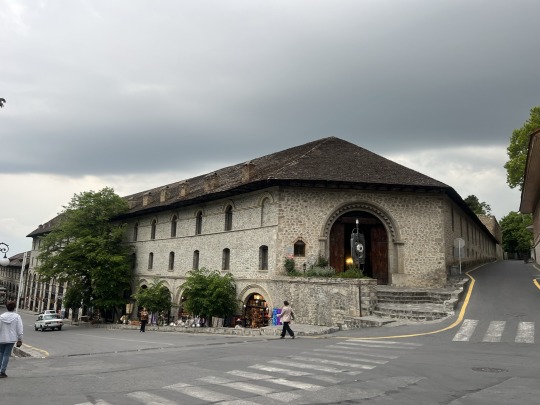
This is the old doorway to the Silk Road caravanserai. It is now a hotel but once had many small rooms surrounding a courtyard where Silk Road traders slept. The camels could come in through these doors and be tethered in the courtyard.

The camels were in the middle. It was a safe stop for the traders.

Passage from the front door to the courtyard.
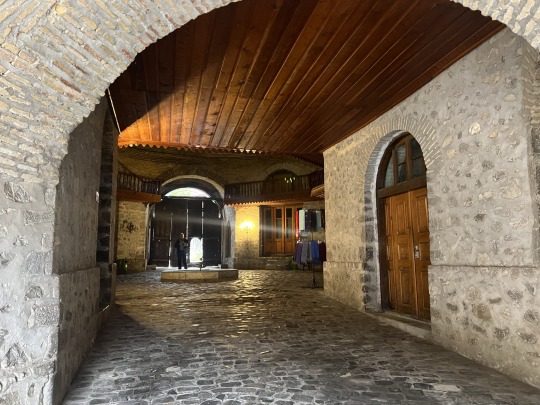
in the old city a wall surrounded the royal palace, gardens and church.
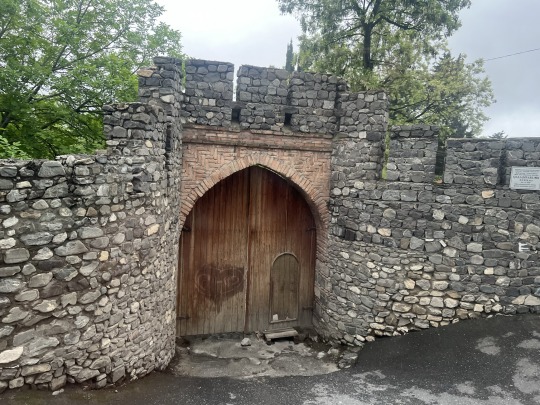
This is the summer palace of the royal family built in 1762. It is a World Heritage building.It was absolutely beautiful inside with all the walls and ceilings painted with scenes and flowers. They had rugs in each room with the same pattern as was painted on the roof.
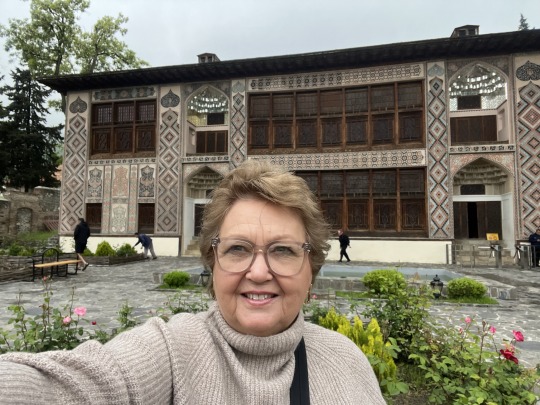
Close up of the details on the outside of the palace.

On either side of the garden were two 700 year old plane trees. You see these garden fences made of wood all along the way. We are up in mountains so it’s much cooler.
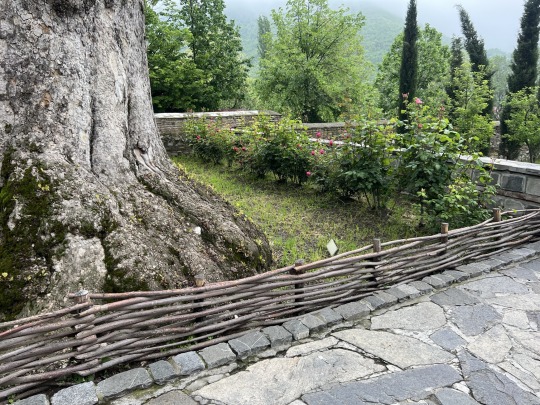
A church inside the walls.
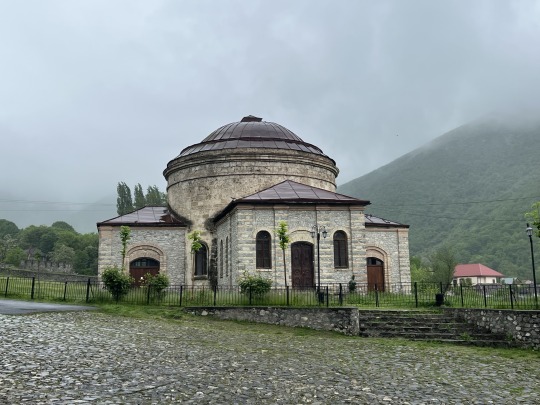
This is a pretty typical street scene. There are always groups of men around and lots of these little Lada cars from Russia. Even though there are women in this photo you don’t see that many in comparison to men. We asked our guide about this and his answer was basically why would you want the women with you and he is only fairly young. He did say it was different in the city. All day today we have been in lovely green areas travelling close to the mountain range.

As you drive anywhere in Azerbaijan you see gas pipelines. None of them are buried and they mostly run about a foot from the ground only going high near a door or gateway. Apparently all homes have a plentiful supply of gas and electricity all over the country no matter what the dwelling.

We crossed lots of stone leaden rivers. River rocks are used extensively for building houses, fences and roads.

Another street scene with more Ladas.

The Azerbaijan border before Georgia. It was quite a process to get through. It was harder to leave then when we arrived.
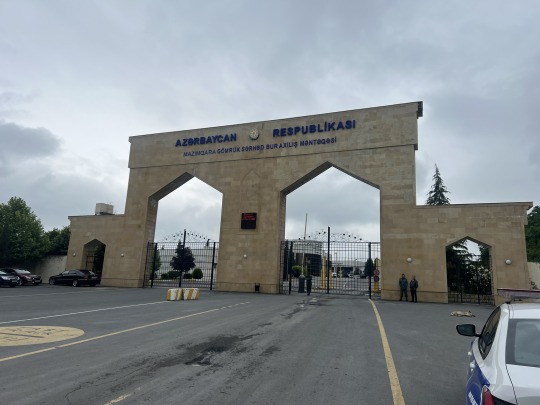
At the border we had a security check then we had to walk a distance with our bags along this intimidating passage. Very Russian looking. Then a long passport check, then another even longer walk. More checks then finally we were out of Azerbaijan.
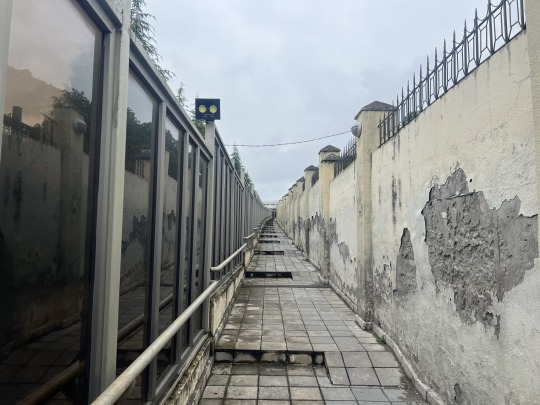
Then it was a shorter walk across the river into Georgia which was a much quicker passport and security check. Our new guide and driver were on the other side to pick us up.
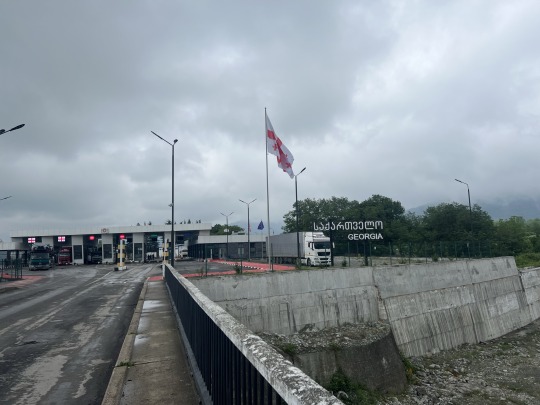
We are travelling in a mini bus now. I’m still sitting at the back of the bus but it’s pretty bumpy in the smaller bus.

Sheep everywhere. Georgia are the biggest supplier of lamb in the region.
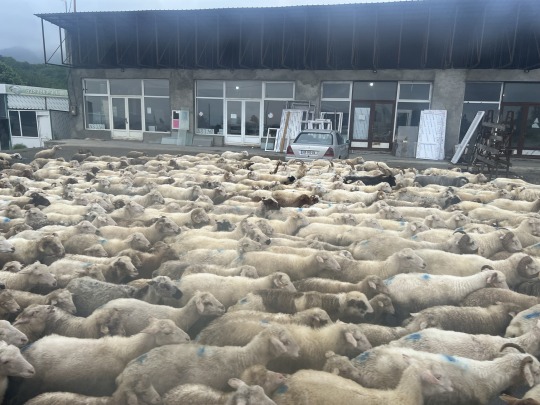
For lunch we stopped at a vineyard. We ordered then had a tour of the place which was owned by twin brothers. Georgia is a big producer of wine.
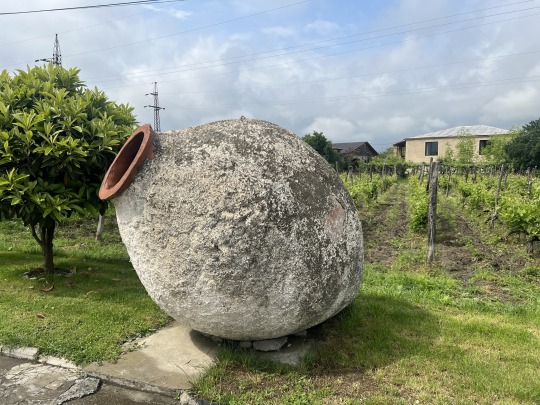
They store the wine in bug clay pots which are made in certain areas of the country. When the wine is harvested it is placed in the long wooden troughs and squashed by feet. The juice runs down into the clay pots which are buried in the ground.

There was a museum at the winery that showed each of the wine making process. Here they are burying the pots.

When the pots have to be cleaned which can take a few hours a small person has to climb inside. At this winery the owners teenage son gets the job.

Lunch was good with some wine and then it was onto our hotel. This plane tree is 900 years old and was just near the hotel. It was wet by this time of the day. The hotel was very nice after a long day travelling.

0 notes
Text
Living on the frontline : 1985 : Dave Asher, 21 Aharonson Street, Tel Aviv
“There’s a bomb!” someone shouted. “There’s a bomb!”
I had just collected ‘NME’ from the newsagent that reserved it for me each week and had been lazily staring at a display of the new ‘designer’ stretch jeans in the windows of Gloria Vandebilt’s shop. All had been calm on the city’s main shopping street. Then suddenly it was chaos. People ran in all directions as if their lives depended upon it … which they did. Men, women and children screamed as they fled down side streets, their shopping bags flying behind them like parachutes. I was in amongst them, running at full pelt until I thought I was far enough away from the suspect device. How would I know? I didn’t. Did I hear an explosion? No. Was it really a bomb? I never knew.
On the walk home, I called in at the post office and joined a lengthy queue at the counter for overseas mail. Once I handed over my letter, the man behind the counter inspected it and adopted the withering look of an adult castigating a child … or a new immigrant.
“You cannot send this,” he said, visibly weighing up my ignorance. “We are at war.”
“Oh,” I said sheepishly, taking back my letter. “Okay. Thanks.”
Where I came from, you could send a letter anywhere in the world. I had spent much of my childhood doing just that, writing to radio stations as far away as China, Russia and Syria … and receiving replies. However, I was now learning that life is different during a time of war. I had written a fan letter to ‘Radio One’, an FM station in Beirut, Lebanon with English-speaking DJs who played the latest international hits, interspersed with familiar identification jingles stolen from ‘BBC Radio One’. Since radio transmissions ignore borders and war zones, I had become a committed listener in recent months. Now I had to return home with my unsent letter.
‘Home’ was temporarily a house at 21 Rehov Aharonson in Tel Aviv, where I was sleeping on the living room floor of the lower flat rented by fellow Brit Dave Asher. He was a well-known DJ in Israel from having presented the ‘Voice of Peace’ radio station’s breakfast show for several years. There were drawbacks to my accommodation. One morning I awoke to find ants nesting in my hair, while the nocturnal journeys of slugs from behind the adjacent bathroom sink gave me frequent ‘Alien’-type nightmares. But Dave had let me stay for free and I was grateful for his generosity. Weeks turned into months; how quick they pass.
Dave had a job as DJ at a city centre basement lesbian nightclub which he kept inviting me to attend. I did visit on one occasion, but was faced with the challenge of convincing two burly doormen that I wanted to enter a female-only club filled with scantily clad women because I said my male friend was working inside. Dave was also the DJ at a packed concert by American drag queen Divine in a huge former cinema, one of the most entertaining events I have attended. My crazy plan was to remain in Tel Aviv by finding a job in the record industry, for which Dave had helped me make contact with people he knew in the business. Pre-internet and pre-mobiles, this required a lengthy wait for replies to handwritten letters.
As summer was hot inside the flat, at the end of the day I would walk the short distance to the end of the street and sit on one of the public seats along the promenade. I could put my feet up on the sea wall, read the day’s ‘Jerusalem Post’ newspaper, watch the sun set over the Mediterranean and cool down in the onshore breeze. One day, a man seated near me asked if he could read my paper when I had finished with it. He spoke in Hebrew and I replied likewise.
By then, I had learnt enough of the language to hold a basic conversation. The frustration of not even understanding destinations displayed on the front of city buses had forced me to learn the Hebrew alphabet and numbers from a schoolbook. Every afternoon I developed my vocabulary by watching ‘Sesame Street’ (‘Rehov Sumsum’ in Hebrew) on television, where the first word I learnt was the ‘dustbin’ in which Grouch (Moishe Oofnik) lived.
I was suspicious of this man trying to strike up a conversation because, weeks earlier, I had been sunbathing alone on Tel Aviv beach when a man came and sat far too close to me on the sand and propositioned me for sex. He appeared to interpret my indignant refusal as merely ‘playing hard to get’ and continued to pester me, so I now avoided the beach and its potential for further unwanted attentions.
Thankfully this man on the promenade seemed different. Because our initial conversation had been in Hebrew, he found it hard to believe that I was not a recent immigrant to Israel struggling to learn my new language. After several rounds of questioning, he was eventually convinced that: I was not Jewish; I was British; I spoke English; and I was Christian. Only once these facts had been established did he have sufficient confidence to identify himself to me as a Christian Palestinian.
“Meet me here at the same time tomorrow,” he told me. “There is something I want to show you.”
Despite an incendiary device having recently exploded at the end of our street, thankfully with no casualties, I decided to risk meeting this man again the next day on the promenade. We walked to a walled compound a few hundred metres away where he spoke Arabic into the intercom, the gate opened and we walked through a garden into a house. He took me inside and knocked on what appeared to be a bedroom door. When it opened, it was immediately apparent that this was no normal small bedroom.
Bunk beds were butted up against each other on three walls of the room, leaving no space in their midst for other furniture. The small window had been covered so that the room was dark except for a single lightbulb on the ceiling. After my entrance, I was being stared at by six men, each sat on their bunk, their sweat thick in this non-air-conditioned room. My guide explained to them in Arabic why I was there, then he turned to address me.
“I wanted you to see how Palestinians have to live in Israel, the same land in which our families were born,” he told me. “Before dawn every day, we are employed outside to clean the beaches, sweep the streets and collect rubbish but, by the time the sun comes up and the crowds come out, we have to make ourselves invisible by returning to accommodation like this. As a fellow Christian, I wanted you to see how we are forced to live in our own homeland so that you can tell people what life is really like in Israel for those who are not Jews.”
A man arrived with a big bag of takeaway food which he started to dole out to each of the men in the room. I wondered to myself if I was to be included in their evening meal and how that could happen when there was no available space for a guest to sit. My guide quickly quashed that notion.
“The men will not eat their food in front of a stranger,” he explained. “We have to go now.”
It had only required a few minutes in that crowded room for the man to have made his point. He was understandably angry about his people’s situation. He told me that, having seen their conditions myself, I now had evidence to refute the disinformation that most of the world believed. We left the compound, he went his own way and I never saw him again.
After several months of messages, letters and calls from public phone boxes, I was finally offered a meeting with the head of an international record company’s Israeli subsidiary in his penthouse flat. There I explained that I had recently secured airplay on British radio for Israeli pop records through my knowledge of the UK radio industry. I believed I could do more like this to develop Israeli music’s presence overseas.
“You should go home,” he told me sternly. “Israel is not the place for you. There is a war going on. The economy is in bad shape. Things are terrible here. Go home and find yourself a job there.”
I departed Israel on the next available flight, disappointed by my failure to secure a job. I left behind an economy with an annual rate of inflation nearing 1,000% and a currency so devalued that it required a thick wad of banknotes just to buy a loaf of bread. Prices in shops had to be updated daily, written on post-it notes stuck along shelf edges. At checkouts, there were insufficient banknotes in tills to provide change, so customers were given the equivalent value in sweets and candies. Coins had become obsolete because they were worthless. I was carrying around several hundred banknotes stuffed down the front of my underpants because my wallet was now too small.
Back in Britain, within three years I had organised the release and promotion of an Israeli record that reached number 15 in the UK singles chart, accompanied by a ‘Top of the Pops’ television appearance. It became the biggest selling Israeli record in Britain since Esther and Abi Ofarim’s ‘Cinderella Rockefella’ in 1968, coincidentally my very first single purchase. Singer Ofra Haza became an international star, later recording songs for a Disney movie. Despite failing to find a job in Tel Aviv, I had managed to successfully pin music from Israel on the ‘world music’ map of the 1980’s.
It was Dave Asher who had first introduced me to Ofra Haza’s music in 1985. Two decades later, his job was presenting the breakfast show on a radio station … in Beirut!
#commercial radio#Dave Asher#Grant Goddard#Israel#music#Ofra Haza#pirate radio#radio#radio broadcasting#radio industry#radio sector#radio station#Voice of Peace#world music
0 notes